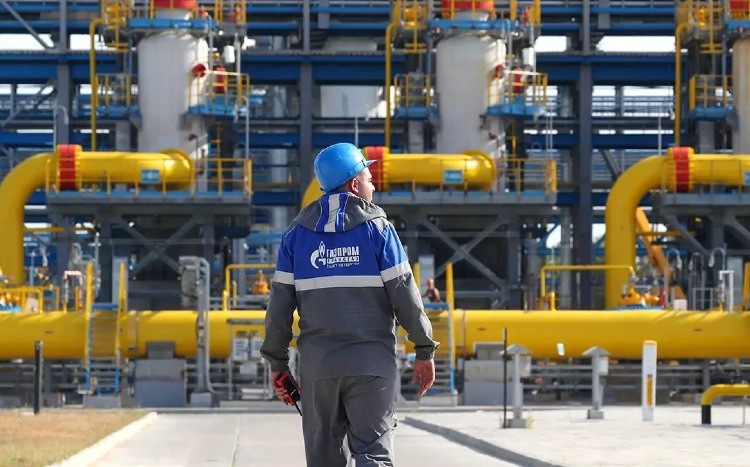Amidst these chaotic times, Russia has increased pressure on many European economies by reducing the natural gas supplies further, raising fears of a fuel shortfall this winter. European officials describe these Russian fuel supply cuts as an attempt to retaliate against Western countries for backing Ukraine.
On Friday, Russia decreased the natural gas deliveries to Italy and Slovakia by half and cut off the gas delivery to France. It was the third day of gas cuts in a mounting economic confrontation between Moscow and the West. Previously, Moscow has cut off natural gas supplies to Poland, Bulgaria, Finland, the Netherlands, and Denmark.
Russian fuel supply reduction has increased the prospect of a fuel shortfall if Europe enters winter with less-than-full supply. It has also led to rising prices, additional strain on economies and high borrowing rates, along with the threat of a recession.
In Germany, the authorities blamed the supply reduction on maintenance repairs for the Nord Stream 1 pipeline under the Baltic Sea, claiming that needed equipment was held up in Canada due to Western sanctions.
In France, no gas has entered the nation over its border with Germany since Wednesday according to sources. In Italy, the eurozone’s third-largest economy, Gazprom delivered half of the gas it had requested.
“It is obviously Putin’s strategy to rattle us, drive up prices and divide us. We won’t allow that. We will defend ourselves resolutely, precisely and thoughtfully,” said Robert Habeck, Germany’s economy minister as published in WSJ News (The Wall Street Journal News).
According to some leaders this is Russia’s to European sanctions and military backing for Ukraine by focusing on Europe’s ability to power its economy. Italian Prime Minister Mario Draghi said that the explanation was just a political decision.
“Both we and Germany and others maintain it’s a lie, there’s a political use of gas,” Draghi said at a news conference during a visit with German and French leaders to Kyiv.
Ukraine’s president, Volodymyr Zelenskyy, called the cutbacks “blackmail against both individual countries and Europe as a whole.”
There is little immediate concern about a shortage over the summer, when demand for gas in Europe tends to be lower. After a quick start in filling caverns this spring, the bloc has plenty natural gas in storage to use in the coming months. Executives, authorities, and dealers are concerned that the continent may run out of gas later this year, when lower temperatures increase demand and gas begins to flow from storage. Europe has few options. The continent has traditionally relied on Russian fuel supply to generate energy, power industry, and heat homes, which the Kremlin is now exploiting.
Nord Stream which is the major conduit for Russian fuel supply into Europe, barely hit 55 percent of its rate at the start of the week on Friday as per reports. Uniper SE, Germany’s largest importer of Russian gas, said to WSJ (Wall Street Journal) that it received just 40 percent of the gas it had sought from Russia’s state-owned exporter, Gazprom PJSC.
Following Russia’s invasion of Ukraine, the European Union joined the United States in slapping broad financial penalties on Russia. However, European nations have been braced for economic punishment from the Kremlin, and officials have depicted this week’s natural gas supply squeeze as an attempt by Moscow to impose political pressure and drive-up energy prices.
Natural gas prices in northwest Europe remained unchanged Friday at 125 euros, or about 131 USD per megawatt-hour. They have increased by more than 50 percent this week and are now more than four times higher than a year ago.
Russian fuel supply cuts pushed up already-high natural gas prices, prompting the German government to urge consumers to save energy. Short-term gas prices remained up on Friday, with month-ahead gas contracts trading at 126 euros (132 USD) per megawatt, up over 50 percent from Monday.
“Every kilowatt hour helps in this situation. It is a situation that is serious, but not a situation that endangers supply security in Germany,” said German Vice Chancellor Robert Habeck in a statement published on NBC. Germany gets about 35 percent of its natural gas from Russia.
However, European countries are trying to avoid the situation of gas shortages and maintain the sanctions on Russia. According to reports, Germany will soon restart coal-fired power facilities and offer incentives to firms to reduce natural gas consumption, signaling a new phase in Europe’s economic conflict with Russia. The announcement was made on Sunday.
Europe had announced intentions to decrease 90 percent of its Russian oil imports and two-thirds of its Russian gas imports by the end of the year in order to lessen its reliance on Russian oil and gas.
“Europe must not to be complacent and urgently scale-up coordination so the continent is prepared for a possibly difficult winter ahead,” said Simone Tagliapietra, a senior fellow at Bruegel to NBC, a think tank in Belgium.
But the Russian fuel supply cuts has not been loss making for the country. Russia is currently exporting more oil than before the war, and rising prices mean it is raking in approximately 20 billion USD in international sales each month. China and India are the major buyers of the discounted Russian oil.
China’s crude oil imports from Russia increased by 55 percent year on year in May, surpassing Saudi Arabia as the leading supplier, as refiners took advantage of discounted supplies amid sanctions imposed on Moscow for its invasion of Ukraine.
Chinese General Administration of Customs figures show that the imports of Russian oil totalled roughly 8.42 million tonnes, comprising supplies pumped via the East Siberia Pacific Ocean pipeline and seaborne shipments from Russia’s European and Far Eastern ports.
European Union’s decision to prohibit most Russian oil imports is destined to change everything. Analysts expect that Russia’s output will fall by 1 to 2 million barrels per day, or 10 percent of present levels.
Related articles:

3 Comments